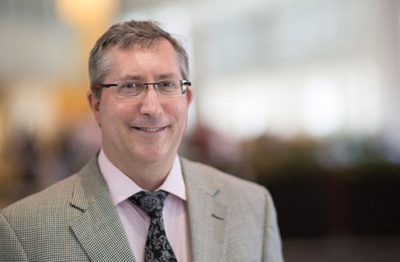Kosorok helping to transform medicine with artificial intelligence
November 16, 2018
While computers may not replace human doctors anytime soon, artificial intelligence could soon play a critical role in our medical care.
Michael Kosorok, PhD, W.R. Kenan Jr. Distinguished Professor and chair of biostatistics, is leading the way in utilizing artificial intelligence (AI) to benefit public health.
“I’m interested in how we can use AI to make good decisions in medicine – for example, whether to give a patient drug A or drug B,” said Kosorok, who teaches in the UNC Gillings School of Global Public Health. “We’re on the cutting edge of this research, and we think we’re very, very close to breakthroughs.”
Computers already have learned how to diagnose skin cancer and assist surgeons, but Kosorok believes AI is poised to make even more significant advancements in the next five to 10 years and to bring a new level of personalization to patient care.
Other researchers in the Gillings School of Global Public Health and elsewhere, for example, are looking at how computers can use a patient’s personal information, such as demographics and family medical history, to calculate which treatment choice is most likely to work for that individual patient.
Kosorok’s research could bring that same technology into patients’ daily lives, helping them make better decisions for their health on a day-to-day basis.
Along with Elizabeth Mayer-Davis, PhD, Cary C. Boshamer Distinguished Professor of nutrition and medicine, and chair of nutrition, Kosorok is developing a wearable device to monitor the health of patients with Type 1 diabetes. The tool, which would measure heart rate, physical activity level, insulin use and blood glucose levels, could alert patients to danger and even suggest preventative actions.
Kosorok imagines a future when patients have various wearable devices guiding them in daily life — for example, a patient with anxiety may use an apparatus that offers strategies to reduce his or her heart rate when an anxiety attack comes on.
“One might say, ‘I don’t want a robot to control my life,’” Kosorok said, “but the idea would be that the device would offer decision support, not forced decision making.”
While artificial intelligence might not discover a cure for all cancers or offer the same kind of human care as a doctor, Kosorok said this technology has the potential to extend the human lifespan significantly.
“Part of the future of health care will be to continue to learn and improve all the time, but we imagine that people would be living longer, more productive and happier lives,” he said. “It’s very rewarding to collaborate on research teams that have a concrete goal to improve human health and to watch that progress unfold.”
Contact the Gillings School of Global Public Health communications team at sphcomm@listserv.unc.edu.

